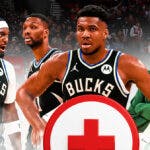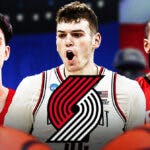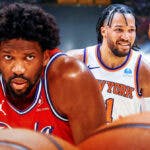Winning on the second night of a road back-to-back is tough in the NBA, especially for teams based on the West coast facing Eastern Conference foes. Don't expect the Portland Trail Blazers to take any solace from that reality considering the quality of Monday's competition, though.
The Philadelphia 76ers beat the Blazers 113-103 at Wells Fargo Center, sending Chauncey Billups' team to a second straight loss in the span of 24 hours. More disappointing? Portland failed to beat the Sixers despite not only Joel Embiid resting his fragile right knee and Ben Simmons continuing to sit out, but Tobias Harris proving a late scratch for Monday's game due to health and safety protocols, too.
Here are three pressing concerns facing the Blazers in wake of perhaps their most dispiriting performance of the young season.
No Attack at the POA
In wake of getting ripped to shreds by the Charlotte Hornets after halftime, it was easy to assume the short-handed Sixers would prove a quick-acting remedy for Portland's wildly inconsistent defense. Wrong. The Blazers played with less edge and less intensity against Philadelphia from the opening tip, falling all too frequent victim to both scheme confusion and simply getting beaten one-on-one.
Portland's defense at the point of attack was even worse versus Tyrese Maxey, Shake Milton and Georges Niang than it was against LaMelo Ball, Miles Bridges and Terry Rozier. No Blazer is immune from criticism for their lack of teeth guarding the ball, but Damian Lillard deserves the most of it. You'd hope it wouldn't be quite so easy for the likes of Seth Curry and Tyrese Maxey, gifted in their own ways but hardly unguardable stars, to blow right by Lillard for layups.
C.J. McCollum might have been a little better than Lillard, but didn't exactly offer much resistance when the Sixers went at him off the dribble. Anfernee Simons was exploited, too. Robert Covington was an abject liability defensively, and even Nassir Little was taken advantage of in isolation.
“We didn't have it tonight defensively,” Billups said after the game. “We were a step behind.”
Make that two or three steps behind.
The surprise absences of Embiid and Harris gave the Blazers a golden opportunity to escape a tough road back-to-back with one win, going into Wednesday's game against the surprisingly stout Cleveland Cavaliers with some palpable momentum. Instead, Portland will have to conjure all the energy it can muster to avoid finishing this quick three-game road trip winless.
Robert Covington Gets the Hook
Covington entered Monday's game averaging fewer points and shooting worse from the field and beyond the arc than any season since 2014-15, when he first established himself as a rotation player. After playing just 19 minutes against his former team, easily his lowest amount of 2021-22, Covington is now getting less court time than any campaign since then, too.
A surprisingly low single-game minute total isn't a surefire indicator of a player—even one who's struggling like Covington has in the season's early going—falling out of favor with his coach. Matchups matter in the NBA, and the Blazers are far deeper with two-way players at forward than they were a year ago, Covington's first in Rip City. But his objectively damaging performance on Monday, combined with Billups' quick second-half hook for him, means Covington's lack of playing time could be the beginning of a bigger story.
This just can't happen to a defense-first player like Covington.
He's also been more jumpy and confused executing Portland's zone than any of his teammates, none of whom seem comfortable when Billups goes to that gambit.
It's not like Covington made up for it on the other end. He compounds the first issue of passing up a pick-and-pop three here, putting the ball on the deck to nowhere before telegraphing a kickout to McCollum.
Billups had seen enough after that, calling timeout to help stem the Sixers' momentum. When Portland was back on the floor following the break, Little was in Covington's place at power forward—a departure from the Blazers' typical rotation so far this season. Little normally gets Norman Powell as Billups' first sub, then Covington gets subbed out by Larry Nance Jr.
That change wasn't the only one Billups made to his lineups in the second half. Covington didn't get off the bench again once Little came in for him early, staying glued to the sideline even as Portland played small-ball with Nance at center and closed the game surrounding Jusuf Nurkic with four guards.
Maybe Billups simply decided Covington didn't have it on Monday, content to rock the boat of breaking from the Blazers' normal rotation to give his team the best chance to win. It would obviously be shocking if Covington wasn't in the starting lineup against Cleveland, or even if his minutes were cut again. But combined with his diminished two-way impact coming into this game and the availability of Tony Snell, solid in his Portland debut, Covington's ugly performance and eventual benching against the Sixers seems worth reading into.
Number Crunching
Billups mentioned the Blazers breaking from their normal rotation after the game, alluding to the challenge of finding 10 players minutes now that Snell is healthy. That's a problem most teams would love to have, but could be an awkward one for Portland to navigate given the reputation and experience of guys like Covington, Snell and Nance—not to mention promises made to them before the season.
Snell didn't sign with the Blazers for the veteran's minimum to sit on the bench next to C.J. Elleby and Greg Brown III. Nance said all the right things at Media Day about accepting whatever role he's given, but is coming off a pair of seasons that established him as a viable starter. Cutting Covington's minutes would be fraught for Portland considering he's a free agent this summer.
Simons and Little aren't going anywhere; they give this team some much-needed athletic pop their older teammates can't replicate. Playing more small-ball is the optimal solution, and one that seems plausible considering the extent to which Billups used it on Monday and the injury histories of the Blazers' centers. When Nurkic and Zeller are healthy, though? Portland's peak depends on Nurkic reaching his, and Zeller's provided a jolt on either or both sides of the ball most every time Billups has called his number this season.
Billups had enough to deal with while proving the Blazers' new schemes are workable at a high level and continuing to build relationships with his players, even before accounting for the innumerous other lessons a rookie head coach has to learn on the fly. Somehow juggling Portland's newfound numbers crunch is a headache he didn't need, especially if managing it best means Covington losing a major chunk of minutes.




